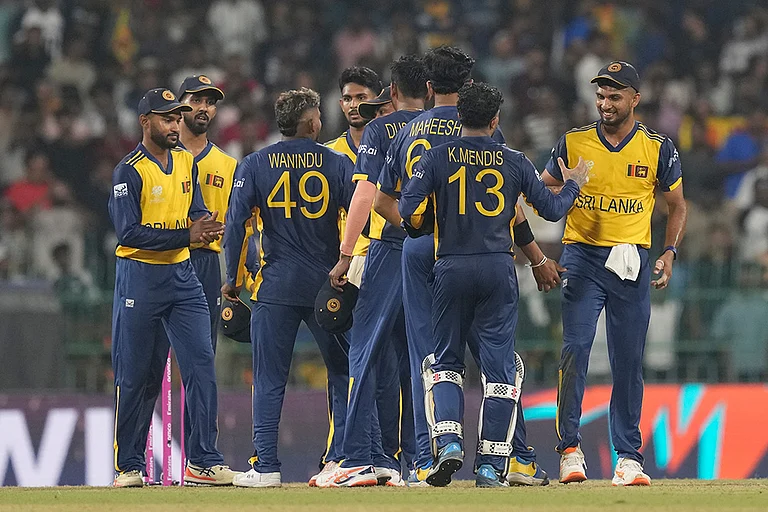BUT the crisis has only just begun in Pakistan. "Everyone who played a role in this game did it by coming down from a position of honour and respect, the judges of the supreme court included," commented Rehmat Shah Afridi, editor of the English daily, The Frontier Post. "They all collaborated with each other to earn a bad name for Pakistan." And as Sharif tamed the presidency and the judiciary, many asked whether his 'heavy mandate' was a license to ride roughshod over all other institutions. As a political observer put it, Sharif should not "attempt to dominate or decimate the other national institutions at the expense of checks and balances which are a sine qua non of any democratic dispensation".
Although he has managed to get rid of a difficult chief justice, it is still not clear what will happen to the various cases pending against Sharif in the supreme court. "Sharif has just been given breathing space. It is strange that the one man responsible for the crisis has not resigned," said senator Aitzaz Ahsan, leader of opposition Pakistan People's Party (PPP) in the upper House.
As the drama ended, eveningers in Sharif's hometown, Lahore, roared: "Sher babbar sher ban gaya", referring to Sharif's election symbol, the lion. But it also quite ironically articulated fears among the public that Sharif's victory could give free rein to his authoritarian tendencies. As an opposition leader in Lahore said: "Leghari's resignation has paved the way for a dangerous concentration of powers resulting from the disruption of the constitutional balance."
More significantly, this episode of judicial and constitutional chaos revealed ethnic and provincial faultlines in the Pakistani polity. It brought things to such a head that Aitzaz, a Punjabi himself, told Outlook: "The Punjabi establishment, in order to save a Punjabi prime minister, is threatening to strike at the very roots of the federation." Another PPP member and former interior minister, Nasirullah Baabar, accused senior Punjabi generals of prevailing over non-Punjabi generals amongst army chief General Jehangir Karamat's corps commanders to give Sharif a fresh lease of life. This alleged provincial division in the military, which was only talked about in the last 50 years, is now threatening the foundation of the state itself.
"Sharif's instincts, like those of many around him, are not very democratic in the absence of countervailing forces," says Eqbal Ahmad, a well-known Pakistani political scientist. "That could damage the country quite badly.The court is already badly damaged and this could leave Sharif as the sole figure in power with nothing between him and the army. There is a risk—hopefully it will not materialise—that he could abuse his powers."
THE whole affair has also left the army looking somewhat frayed. In fact, one advocate filed a petition in the supreme court against the army chief accusing him of violating the constitution and jumping into the political fray. Observers wondered if Gen. Karamat could send the army to arrest Asif Zardari last year on instructions from the president, why couldn't he comply with a valid constitutional request by the chief justice and the president asking for protection for the former.
And what about the judiciary, which for the first time was accused of judicial terrorism? As the dust settles on Constitution Avenue, where the president's house, the prime minister's secretariat and the supreme court are located, the divisions within the judiciary will crystallise.
As for Benazir Bhutto, she was not even in the country when her political enemy was caught in the midst of the storm. Right through the crisis she was away in Sweden and Dubai! "Has a deal been struck between Benazir and Sharif?" asked a PPP leader. "If it is so, it could only center around going easy on the cases against Asif Zardari. Nothing else matters to Benazir."
Indeed, her partymen in Punjab are frustrated by the parliamentary party's strange reticence on its position on the dramatic end to the crisis. They were not impressed with the the PPP's demand for Sharif's resignation for his role in forcing the constitutional and institutional crisis. They said the unconstitutional role of the judges, particularly those who sided with the government, should not have been ignored and called for a campaign to highlight the nature of the meetings between the judges at the Quetta and Peshawar branches of the supreme court and Sharif's people. They even alleged that Leghari had played an unconstitutional role in the crisis, working hand-inglove with the chief justice.
For the fundamentalist Jamaat-e-Islami too, this is actually the beginning of a new crisis. Its chief, Qazi Hussain Ahmed, says those who have been pulling the strings from outside are happy that their designs have been accomplished. Qazi deplored the fact that two symbols of unity, the presidency and the supreme court, have been demolished in one stroke. Now every effort would be made to fan parochial and provincial feelings, he feared.
Back in Lahore, Sharif assured a jubilant crowd that he would use his new mandate to reconstruct the economy. For sure, the challenges on the economic front are in no way less daunting than the political ones Sharif has weathered. But he, at least, has everything on his side. Hence, the great expectations. "Sharif will have no excuses now because he had been insisting the crisis was impeding his attempts to revive the economy," notes a banker. Pakistan's economy is plagued by budget deficits, high inflation, sluggish industrial growth, a $3 billion-plus balance of trade gap and foreign loans worth around $30 billion. Sharif's administration has undertaken structural economic reforms in line with IMF guidelines, earning $1.6 billion loan package for three years.
Then there is the army. Information minister Mushahid Hussain may have praised it for its positive role in stabilising the situation and demonstrating commendable commitment to the Constitution. But some analysts say it could yet cause problems for Sharif, even though this time it sided with him against Leghari. The army had decided that Leghari's departure was "the most reasonable and the easiest" solution, said one political observer. The president had no popular base and the prime minister's overwhelming majority would have made it difficult to sack him. Besides, that would have needed new elections less than a year after Sharif's poll victory. "It would have been difficult to hold elections so soon, at a time when the population is already fed up with the political manoeuvering that they think is taking the country nowhere," reasoned a Lahore-based analyst.
But the battle in the supreme court is far from over. Sajjad has decided to fight his case. The lawyers who stood by Sajjad, when he locked horns with the government, are also still with him and the Supreme Court Bar Association has announced its full support to him.
Meanwhile, the morning after Leg-hari resigned, a new role for him seemed to be emerging from one of the unlikeliest places. His mother party, the PPP. "I had no problems with Benazir, who is my friend. As a person I had no problems with either her or Sharif. But both wanted total power and wanted to subjugate the judiciary," were the former president's last words as he prepared to resign. In 1988 Leghari had won two seats in Punjab, one at the provincial level and the other in the National Assembly. Benazir had wanted him to stay in Punjab to contain Sharif, the then chief minister. But the feudal lord in Leghari felt slighted when he failed to become chief minister and finally Benazir brought him to the federal cabinet.
Retrospectively, it can be said this decision cost Benazir her hold on Punjab. The question now is whether Leghari will want to rejoin the PPP at this stage and whether he will be requested to do so to rejuvenate the party in Punjab. Will the hawks in the PPP see him as the saviour who could fly in to its rescue in Punjab?
As sanity slowly returned to Islamabad, the government was put in a spin once again. The new president has to be elected by January 3, by when the Ramadan month would have started and politicians will be rather short of energy for the conspiracies that are bound to be hatched. Plus, all of Sharif's allies in Parliament are naturally eyeing the slot. Provincialism has come to the fore once again. "It is now right time for a man from Sindh to be president because the Punjabi establishment has made mincemeat of Benazir and Sajjad, who were both from this neglected province," says a PPP senator. In that case, the PML would like to pitch for Illahi Bux Soomro, the National Assembly speaker, who is close to Sharif as well as Karamat.
But legislators from 'Pakhtoon-khawa' province, or NWFP, disagree. "For too long we have been neglected and are not represented in any high office. It is time for a Pakhtoon president," says a member of the Awami National Party. And what about representing Balochistan? "The army will never trust the Jamoori Watan Party, whose leader, Nawab Akbar Bugti, has enough arsenal to lay an armed siege around his province," says a member of the Baloch National Party, a PML ally. The solution, as with all else, will probably be settled by the "disinterested brokers" (the army), who are bandaging their own 'provincial' wounds.





















